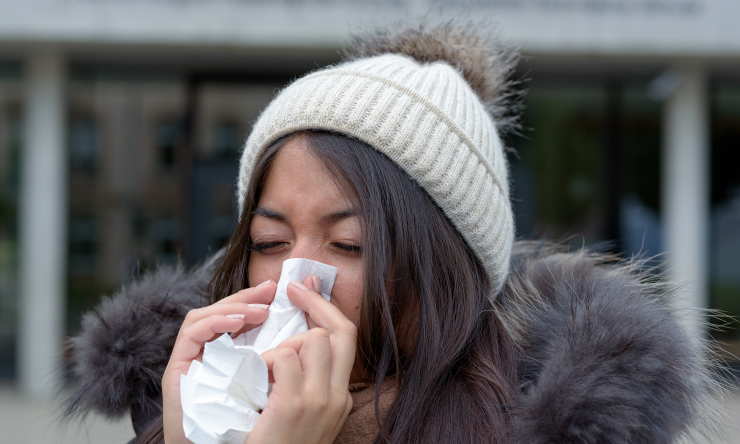Watch for sinus infections as weather changes
Fall weather brings festivities and guests to our homes, as well as some unwelcome guests, including allergies, colds and sinus infections. Dr. Tran Locke, ear nose and throat specialist at Baylor College of Medicine, explains how to identify, treat and prevent sinus infections.
The sinuses are hollow spaces in the bones of the face that connect inside the nasal cavity through small channels. A sinus infection occurs when viruses or bacteria infect your sinuses, causing the lining of the sinuses to become swollen, trapping mucus and debris and preventing drainage into the nasal cavity, Locke said. Most sinus infections are viral and often follow a viral infection like a cold.
“We often see sinus infections in the winter because people are more predisposed to getting colds,” said Locke, assistant professor in the Bobby R. Alford Department of Otolaryngology – Head and Neck Surgery. “I also see patients who have bad allergies get sinus infections when the weather changes. With an allergy flare up, the sinus lining can get very swollen to the point where sinuses can’t drain, and there’s risk for infection due to the buildup of mucus.”
The main symptoms of a sinus infection are nasal blockage or congestion and facial or sinus pressure. But other possible symptoms include decreased smell and discolored drainage and, less commonly, upper tooth pain, ear pressure, headaches and in some cases fever. Sinus infection symptoms usually last 10 days or longer. Mild symptoms lasting less than 10 days are often caused by an upper respiratory infection or common cold, rather than a sinus infection, and can be treated at home with rest, hydration and over-the-counter decongestants.
“I recommend using a sinus rinse to wash any mucus, debris or pollen in the nose,” Locke said.
Patients with severe symptoms lasting longer than 10 days should see a doctor as antibiotics may be required to treat the infection, Locke said. If you are experiencing chronic sinusitis, with symptoms lasting 12 weeks or more, Locke recommends seeing an ENT specialist.
“We want to look in the nose and see if there are polyps, pus or anything else causing that chronic inflammation,” Locke said. “If nasal irrigations, steroid sprays and antibiotics don’t work, surgery may be needed to open the sinuses.”
There are several things you can do to prevent a sinus infection. Maintaining good nasal hygiene can help. Use saline rinses regularly to clean out the nose, keep your allergies under control and avoid exposure to nasal irritants, like smoke. Frequent hand washing also is helpful.











